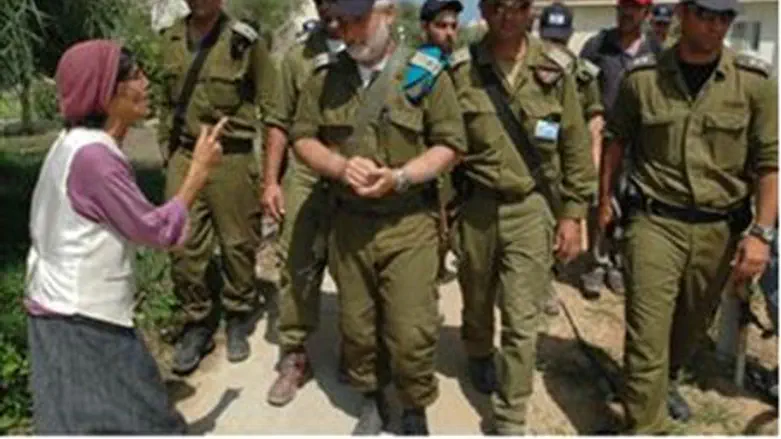
Political party leaders and Israeli media are having a field day mocking Habayit Hayehudi (Jewish Home) chairman Naftali Bennett for his remarks on refusing IDF orders, and the next pre-election polls will reveal how much damage, if any, he caused to the joint Jewish Home-National Union slate of candidates for the next Knesset.
After the Likud party castigated Bennett for saying that he personally could not carry out orders to expel Jews from the homes, Israel Beyteinu mocked Bennett’s backtrack comments that he never encouraged refusal of IDF orders. "Whom do we believe? Bennett number one or Bennett number two,” a party official said Sunday.
Elazar Stern, who is orthodox and is the former IDF manpower chief and now a senior candidate on Tzipi Livni’s party list of candidates, took pain not to attack Bennett personally while ruling out any hint of refusing orders.
“You will not drag me this morning to talk about Naftali Bennett….This is too painful,” he told Army Radio.
However, he pointed out that as manpower chief during the expulsion of Jews from Gush Katif in 2005, “It was very painful.
“In Atzmona, there was a very close friend of mine, and today he is the Chief Rabbi of the IDF, Rabbi Rafi Peretz.”
Stern said he personally arrived at Atzmona when the expulsion orders arrived. "I had to be there precisely because of the difficulty. Our missions are difficult To carry out a raid under fire is not difficult? To stop and search an elderly [Arab] at a checkpoint is not difficult?
“As leader, you cannot let others do the dirty work,” Stern stated.
Trying to contain the damage by his remarks, Bennett, a former elite commando, said Saturday night, "I have served in the IDF for 22 years, as a combat soldier and commander. I fought in all of Israel's campaigns during this time, including unknown ones. I repeat: I never called for refusal of orders, and any intelligent viewer understands this. But in the Likud and the political arena they pounced on my statements, twisted them around, and created the impression that I had called for refusal of orders. In order to gain a quarter of a Knesset seat, they compromised the IDF's unity.”
He explained that his remarks Thursday were “the depth of my heart, and I do not apologize for what I said. However, I am now not a private individual but a public figure, and I will say things in the clearest possible way: an order to uproot an Arab village or a Jewish community is a fatal blow to the most basic human rights, and it places the soldiers before a heart wrenching dilemma between human rights on the one hand, and the obligation to obey orders on the other.
"This is an unbearable dilemma. I pray with my entire heart that such an order will not be given again, ever, but in the bottom line, if worst comes to worst, I say clearly: a soldier must obey the military's orders.”
Bennett tried to turn the issue away from whether a soldier should obey commander’s orders and asked, "Mister Prime Minister – yes or no? Do you intend to uproot Jews from their homes again? We will be a large and meaningful party in order to prevent a situation in which IDF soldiers again have to face such dilemmas, which are not humanly bearable."
Whether Bennett’s remarks have damaged his party in the camping will be seen in the next polls. The Jewish Home-National Union slate has been constantly increasing its strength in surveys, which give the party between 11 and 14 seats in the next Knesset.